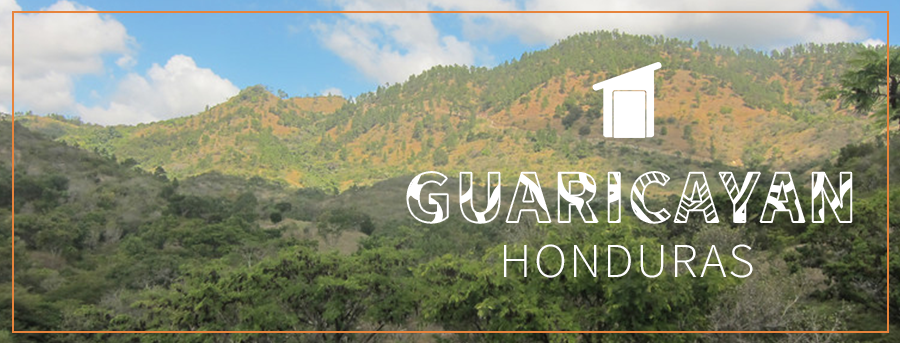
About Guaricayán
Guaricayán is a small community with a population of 185 people in the
municipality of San Juan de Flores. Prior to Global Brigades' arrival, people
in Guaricayán suffered from a lack of potable water, hygiene and sanitation
infrustructure, healthcare, and education. Common colds, parasites, and
diarrheal disease were common. Few homes had concrete floors,
functioning latrines, proper water storage, or efficient stoves with chimneys.
School is offered until 6th grade, at which point most children begin to work
in agriculture to support their families. The closest health center is over an
hour walk away. The average family income is estimated to be
2,400 Lempiras per month, which calculates to less than $1.00 per day.
Guaricayán's Public Health Challenge
Many community members in Guaricayán lacked the resources needed to
improve their homes and prevent diseases caused by unsafe living
environments. The majority of homes were made of adobe, straw, and mud
and few homes had hygiene stations, cement floors, and eco-stoves prior
to the arrival of Global Brigades. Such living conditions triggered disease.
The lack of hygiene stations led to high rates of diarrhea and waterborne
disease, the absence of cement floors caused parasitic infection and
Chagas Disease, and the lack of eco-stoves resulted in respiratory
problems in the community. Not only did the creation of health
infrastructure better the health of household members through improved
sanitation and hygiene, but it also improved their quality of life as the new
water storage units will reduce time spent walking to water sources and
the eco-stove reduced firewood consumption by about 70%.
Although community members recognized the problems inherent to their living environments, they did not have the economic resources nor the technical knowledge needed to address them. Moreover the level of awareness concerning sanitation and the importance of health was very low as the children did not receive any education about the topic.
The Public Health Solution for Guaricayán
Public Health Brigaders from several different universities and the Public Health Brigades in-country team worked in Guaricayán from September 2012 – January 2013. During this time, volunteers and staff members will work with community members to:
• Identify community leaders and train them to form the Basic Sanitation Committee
• Increase cultural sensitivity and awareness by working side by side with qualified masons and project
beneficiaries
• Build 25 eco-stoves, 25 litrines, 25 showers, 24 water storage units, and 92 cement floors
• Conduct educational workshops emphasizing the importance of sanitation and hygiene in the local
primary school
To ensure the sustainability of the in-home infrastructure projects, the Public Health Program provides continuous follow-up in the community. It also forms and trains the Basic Sanitation Committee, a community body formed by local leaders which monitors the correct usageand maintenance of the new infrastructure. Clear responsibilities and powers are assigned to each member, making the beneficiaries themselves an even stronger stakeholder in the Public Health projects.
| Public Health Brigades Chapters that Worked in Guaricayán |
||
| Public Health Brigades Chapter | Month | Volunteers |
| Lower Columbia College | September 2012 | 11 |
| Imperial College | September 2012 | 22 |
| Oregon State University | September 2012 | 12 |
| DePaul University | December 2012 | 22 |
| Drexel University | December 2012 | 12 |
| Duke University | December 2012 | 5 |
| Oakland University | December 2012 | 12 |
| University of Illinois - Chicago | December 2012 | 22 |
| University of Virginia | January 2013 | 14 |
| University of Texas - Austin | January 2013 | 12 |
| University of Wisconsin - Madison | January 2013 | 9 |
| Saint Louis University | January 2013 | 20 |
| Washington University in St. Louis | January 2013 | 7 |
| Brown University | January 2013 | 7 |
| University of California - Berkeley | January 2013 | 16 |
| University of Southern California | January 2013 | 2 |
| Columbia University | January 2013 | 10 |
| Johns Hopkins University | January 2013 | 8 |
Current Status
Completed: January 2013
After numerous successful brigades, the Public Health Brigades Program exited the community of Guaricayán. Exiting the community signifies that the program no longer be brings brigades to this community and will gradually lessen follow-up to one visit every 6 months - 1 year. The Public Health Brigades program trusts that the community members will maintain their projects with the assistance of the trained masons and understand the importance of building safe living environments whenever they construct new homes.
Visit Other Programs in Guaricayán
Global Brigades strives to implement a model of Holistic Development in communities through a system of collectively implenting health, economic, and education initiatives to strategically meet a community's development goals. Learn more about the other programs being implemented in Guaricayán:
![]() Medical
Medical ![]() Dental
Dental![]() Engineering
Engineering![]() Microfinance
Microfinance![]() Water
Water ![]() Business
Business ![]() Architecture
Architecture![]() CHW
CHW
| Project Overview | |
| Volunteers | 223 |
| Beneficiaries | 185 |
| Latrines |
25 |
| Stoves |
25 |
| Floors |
92 |
| Water Storage Units |
24 |
| Hours of Education |
26 |
| Additional Information |
| General Community Profile |
| Public Health Methodology |
| Pre-Brigade Lesson Plans |
| Family Profiles |
| Education Profile |
